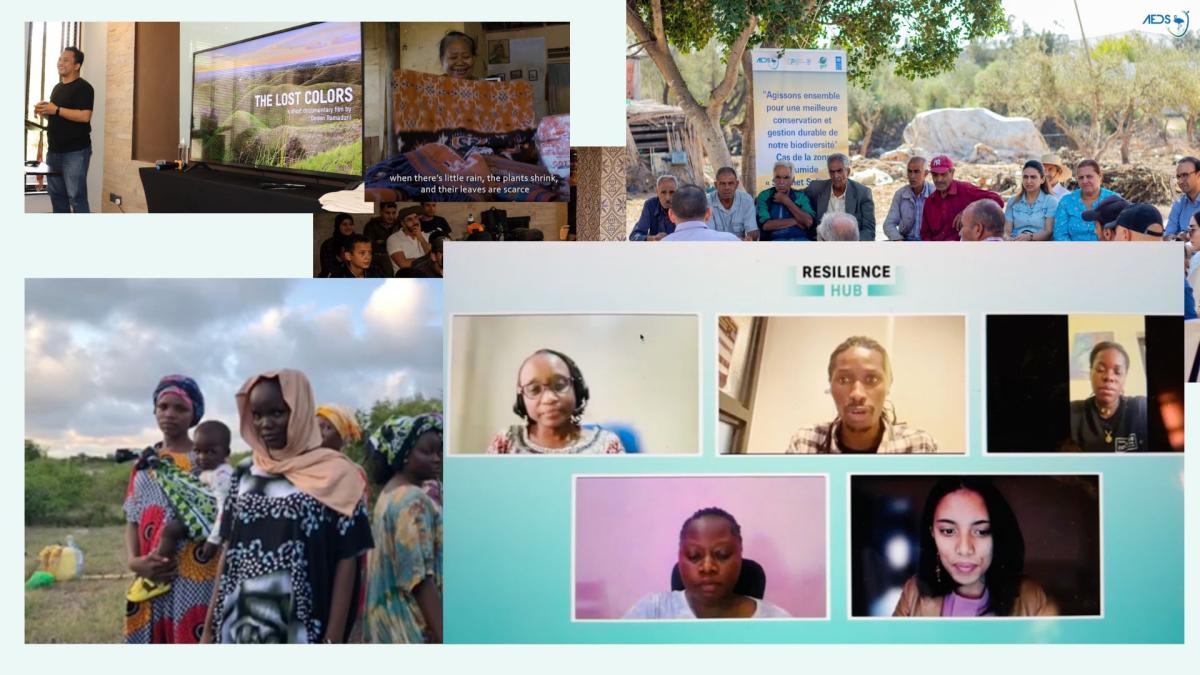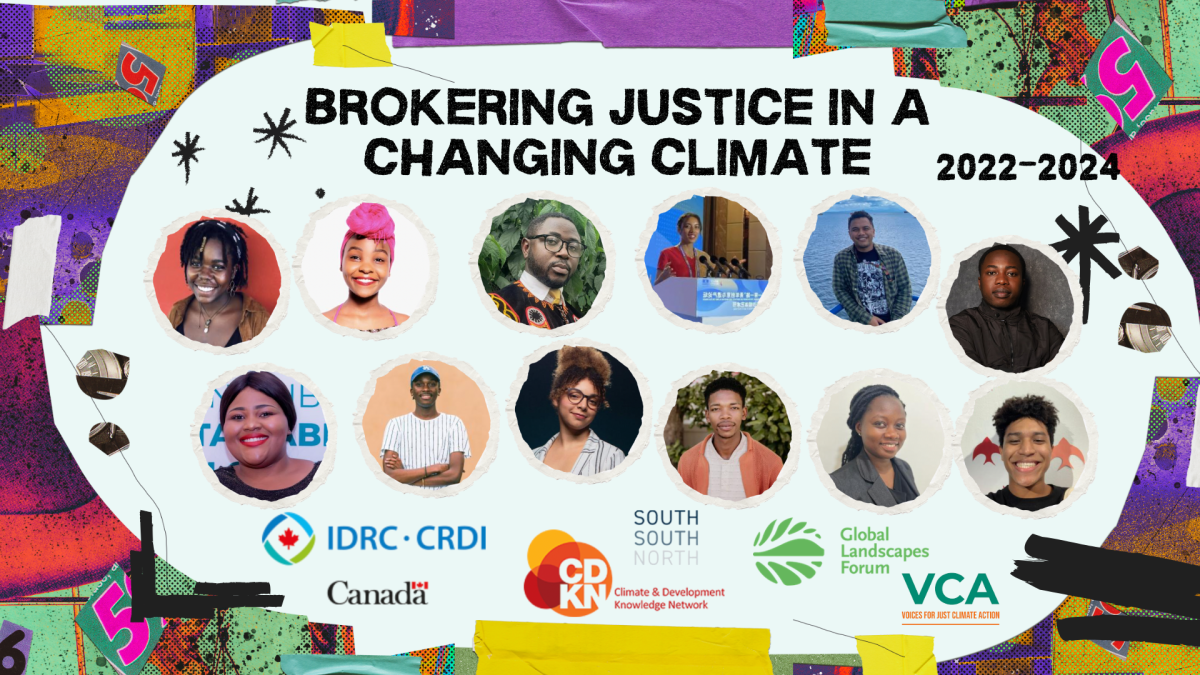Brokering justice in a changing climate: Amplifying African youth voices as pathways for transformation
Brokering justice in a changing climate: Amplifying African youth voices as pathways for transformation
On this International Youth Day, we celebrate African youth across the continent that are stepping forward to advocate for transformative climate justice through storytelling, creative media, and community-led projects. From mental health awareness in Ghana to Indigenous gardening in South Africa and eco-feminist art in Uganda, these 12 young leaders are helping reshape policy, culture, and practice. The following blog, authored by Zizipho Royi and Nadia Sitas, demonstrates that resilient and equitable climate futures become possible when youth are treated as active agents of change.
The urgency for climate action has reached a critical threshold, with communities bearing the brunt of climate impacts and experiencing extreme and intersecting vulnerabilities. Engaging young people in Africa around climate change, particularly within rapidly growing urban areas, is both a necessity and an opportunity. As the most youthful continent in the world, with nearly 70% of its population under the age of 30, Africa’s demographic trajectory makes its youth central to shaping the continent’s capacity for a climate-resilient future.
Urban areas are expanding rapidly, often in ways that compound environmental risks, social inequities, and infrastructural gaps. Young people are already at the forefront of addressing these challenges, yet they are often excluded from formal decision-making processes and have limited access to funding opportunities. Thus, amid this polycrisis of climate change, biodiversity loss, ecosystem degradation and pervasive inequalities, the role of African youth in driving transformative climate justice cannot be overstated.

The Brokering justice in a changing climate project, funded by the International Development Research Centre and implemented by CDKN at SouthSouthNorth, in partnership with the Global Landscape Forum’s (GLF) Youth in Landscape Programme, highlights the critical contributions of a select group of young climate leaders from Africa. Engaging youth meaningfully means more than including them as beneficiaries; it means recognising them as active agents of change in climate action.
This blog reflects on the work of 12 awardees from the Brokering Justice in a changing climate project through Karen O’Brien’s Three Spheres of Transformation: personal, political, and practical dimensions of change that surface the multiple ways in which the awardees' work contributes towards transformative change. While each of the awardees' work spanned multiple spheres and included so much more than what is presented, we summarise their work below according to a sphere that reflected an important aspect of their work.
The Personal dimension: Inner change and empowerment
At the heart of transformation lies the personal sphere, where values, beliefs, and awareness drive change. For the youth awardees, the journey began with capacity-strengthening activities, peer learning, and the co-production of creative outlets including film, art, photography and podcasts.
- Climate awareness through storytelling:
- Nancy Barisoa’s EcoShe project in Madagascar combined bilingual podcasts with artistic expression, giving marginalised women a platform to share their climate narratives. Her recognition, including being named one of 50 Outstanding African Women in Development, underscores the personal empowerment stemming from this initiative.
- Edwin Odhiambo’s Youth and Urbanism initiative in Kenya established an online radio station amplifying urban youth voices, tackling issues like climate change and urban inequality through discussions and creative media.
- Mental health and climate justice:
- Sylvia Hagan highlighted the overlooked link between climate impacts and mental health in urban Ghana. Through workshops and media engagements, she brought psychological resilience into the discourse, illustrating how inner well-being fuels external action.
- Cultural identity and climate change:
- Deden Ramadani’s film The Lost Colours explored the erosion of traditional weaving practices in Indonesia due to climate change. This creative lens showcased how personal and cultural identities intertwine with environmental justice.
- Khawla Houiji’s Fatima’s House, a poetic and evocative film, explored the socio-ecological connections in Tunisia’s Dar Fatma Wetland. It integrated biodiversity, cultural heritage, and multispecies relationships to redefine climate justice through an immersive storytelling approach.
The Political dimension: advocacy and inclusion
The political sphere addresses structural and systemic change. These young leaders brought marginalised perspectives to national and global platforms, shaping a more inclusive climate justice narrative.
- Global advocacy platforms:
- The project facilitated youth participation in international forums like UNFCCC COP and Global Landscapes Forum events. Awardees like Toini Amutenya from Namibia empowered marginalised youth to advocate for equitable climate action through school eco-clubs and an indigenous knowledge centre. Toini continues to advocate for youth through her NGO Youth4Can in Namibia where she elevates their voices in global climate policy processes.
- Artivism and policy engagement:
- Pedro Alace from Brazil mobilised Afro-descendant communities through artistic protests, blending advocacy with cultural identity to defend Amazonian waters and landscapes. His work celebrates his Amazonian heritage while simultaneously rallying collective action against environmental challenges.
- Juvenal Vitalis’ podcast The Crossroad: Voices of Justice highlighted the transformative stories of marginalised leaders in the climate justice movement. By showcasing these narratives globally, Juvenal bridged grassroots advocacy with international dialogue.
- Eco-Feminism in action:
- Aida Namukose’s project Nature Yetu has merged feminist art with climate justice, addressing the triple burden of climate, social, and gender inequalities faced by African women.
The Practical dimension: Locally-led implementation
Practical actions bring transformation to life through locally-led and locally relevant projects. The awardees turned ideas into tangible outcomes that resonate within their communities.
- Sustainable placemaking:
- Elethu Nkala’s Green Rest initiative in South Africa created multifunctional indigenous gardens, fostering spaces of rest and community resilience in urban areas.
- Khawla Houiji’s community engagement at Dar Fatma Wetland expanded its focus to placemaking by integrating community voices and ecological stewardship into the wetland's restoration.
- Intergenerational knowledge sharing:
- Sydner Mokua’s Kijani Yetu in Kenya leveraged food events to connect generations of farmers, promoting traditional farming techniques as tools for climate resilience.
- Community capacity strengthening:
- Ndimuh Shancho in Cameroon engaged children in climate justice workshops through his organisation Voice of Nature, strengthening their capacities to document local climate impacts using mobile devices. This hands-on approach built technical skills and a sense of ownership over local climate solutions. This kind of approach does more than just build the technical skills of the young people he works with; it also instils a sense of ownership, empowering children to become advocates for their communities.
- Edwin Odhiambo expanded his urban youth radio station initiative to include training in podcasting and multimedia, empowering young people to articulate their perspectives on climate justice effectively.
The Brokering justice in a changing climate project serves as a testament to the transformative potential of investing in youth leadership for climate justice, and how these young leaders are reshaping the narrative of climate justice in Africa and beyond. Their powerful stories emphasise the critical and clear need for sustained funding, mentorship, and international collaboration to scale their impact and ensure their innovations reach broader audiences.

Where are they now?
In celebration of International Youth Day 2025, we checked in with some of the awardees to see how they have continued their work and how investing in youth-led initiatives can be a catalyst for sustained action with ripple effects across personal, practical and political spheres.
Since its completion, Ndimuh Shancho, has successfully established a 1,000‑capacity indigenous tree nursery that supports landscape restoration, climate mitigation, and youth-led greening initiatives, through which hundreds of children and their families are engaged in ongoing environmental education. Several other awardees shared their updates.
Sydner Kemunto Mokua:
“CDKN’s support in 2024 played a key role in my climate justice work. The award enabled me to implement Kijani Yetu, a project focused on climate education and climate action in Kaani, Eastern Kenya. And through that experience, what began as a small initiative has since grown into Kijani Mtaani, now a vibrant, community-led movement working on climate justice and land restoration.
The project helped lay the foundation for stronger local leadership, especially among young women, and opened space for deeper conversations about land, agency, and resilience. I’m deeply grateful for the support as it truly helped spark something much bigger than I imagined.”
Nancy Barisoa:
“I have transitioned from my role of Thematic Focal Point on Gender and Land Tenure to now serving as the Regional Focal Point for Africa within the UNCCD Youth Caucus. I was also selected for a nine-month hybrid policy fellowship by AWF and UNEP focused on multilateral environmental agreements (MEAs) and negotiation processes during Conferences of Parties particularly CBD. The CJ Award and CDKN support increased my visibility and helped get access to these incredible opportunities.
CDKN’s support has also been instrumental in sustaining and expanding my podcast series, in fact, I’m currently working on a new series on my participation to the African Ministerial Conference on Environment (AMCEN-20) that should be out on August as well as a youth capacity building for UNCCD COP17 including overview on negotiation processes and lessons learned from previous conferences like UNCCD COP16 I attended in Riyadh.”
Aida Namukose:
“After starting my project with help from CDKN, I then applied for and got into the BeVisioneers Program, which gave me extra funds to continue the project here in Uganda. We’ve onboarded 25 more women and hoping to keep going with programmes”
Sylvia Hagan:
"I’m happy to share that the CDKNJ project has significantly contributed to both my personal and professional growth. The experience has deepened my understanding of climate change discourse.
I believe the work and outcomes from the project played a meaningful role in my recent selection as a Fox International Fellow at Yale University; a prestigious graduate exchange programme focused on leadership and global impact."
Edwin Odhiambo:
“During the first year of implementation, Youth and Urbanism strategically leveraged the visibility and credibility afforded by the CDKN grant to initiate additional fundraising. With the combined support of the seed funding from CDKN and these additional resources, we were able to acquire and equip a modest but functional media studio.
Inspired by the progress made and encouraged by the positive feedback from our community, we dared to dream even bigger. We envisioned a full-fledged, youth-led media house—Urban Online Media—that would serve as a multi-platform content hub rooted in the voices, experiences, and knowledge of people living in informal settlements.”
The legacies of these young people will continue through strengthened networks that foster collaboration, new employment opportunities for awardees that further empower young people to lead meaningful initiatives, and a deeper integration of youth voices in regional and global climate dialogues.
For more information on this project and the work of the awardees, please visit: https://cdkn.org/project/justice-changing-climate
